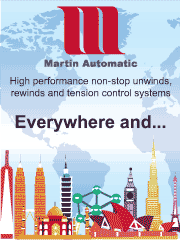Smithers Pira Issues Study of Sack & Kraft Paper
- Published: January 12, 2017
LEATHERHEAD, Surrey, UK | Smithers Pira announces a new report entitled The Future of Sack and Kraft Paper to 2021. The study says steady growth in consumer markets will buoy the sack and kraft paper industry to produce growth of approximately 3%/annum for 2016–2021, pushing global market value to $80 billion in 2021, up from $66 billion in 2016.
The report says expansion is being driven by numerous factors, including the demand for higher quality graphics, which is pressuring papermakers to develop innovative solutions to provide suitable and appropriate printing surfaces. This includes the evolution of digital printing technology for the sack and kraft segment, which is creating opportunities for converters and challenges for papermakers.
Report author Stephen Harrod says that environmental concerns are also helping transform this industry. “Adoption of sustainability practices has been fairly widespread throughout much of the kraft and sack paper industry, and many suppliers now sport a plethora of environmental certificates in various forms. As environmental pressures become ever greater, it is possible that kraft and sack paper manufacturers may start to develop entire product ranges marketed on a sustainability platform. In addition to sourcing from sustainably managed forests, some kraft paper producers have also made attempts to increase the amount of recycled material used in the manufacture of their products.”
According to the study, operating in parallel pressure to reduce costs is leading to technological advances that now enable much lighter weights of paper to achieve the same results. Grammages are declining significantly in some cases from 55 gsm to as low as 2 0gsm. This shift to lighter weights increases the importance of sheet uniformity, bulk and thickness, absorbency, opacity, dimensional stability, surface finish, printability—as well as reducing volume offtake for raw material suppliers.
The reduction in volume caused by downgauging is, however, mitigated by the trend to smaller pack sizes, as smaller packs tend to use more material to hold the same contents. This trend also increases the demand for other consumables—such as inks and adhesives—adding more value to the sack and kraft segment for packaging converters. This evolution is being driven by demographic changes worldwide, where there is a general increase in single parent families and smaller family units. Such downsizing is also being supported by health and safety concerns, with many 50-kg industrial packs being reduced to 25 kg content weights for this reason.
The new study is based on an in-depth combination of primary and secondary research. Primary research included telephone interviews used to generate an up-to-date and accurate picture of the market and to gather information on the sack and kraft paper segments that is not available from published sources. Secondary research was based on extensive literature analysis of published data and trends collected from leading companies worldwide. The company says the report provides a unique depth of information and analysis.










